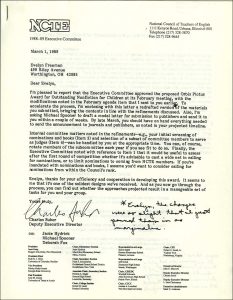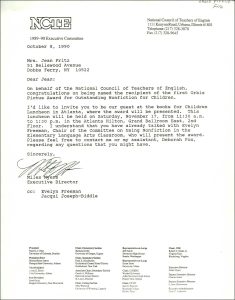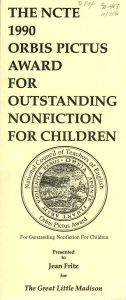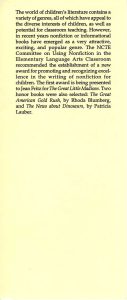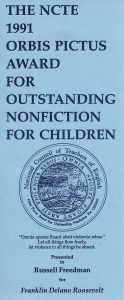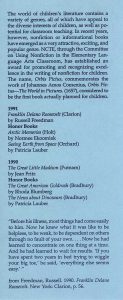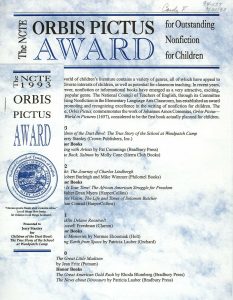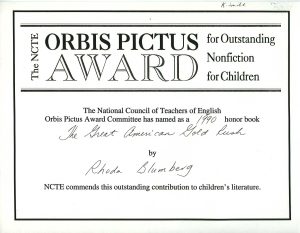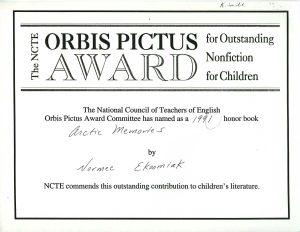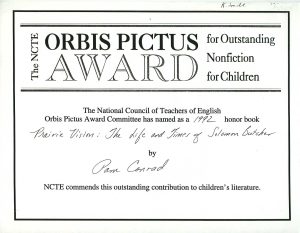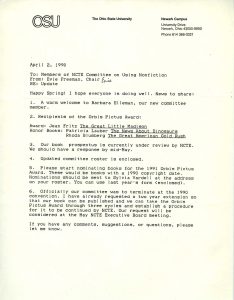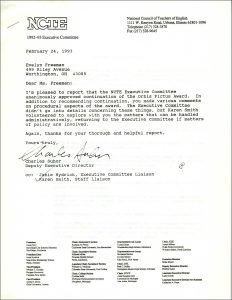“Before his illness, most things had come easily to him. Now he knew what it was like to be helpless, to be weak, to be dependent on others through no fault of your own…. Now he had learned to concentrate on one thing at at time. And he had learned to wait for results.”
From Franklin Delano Roosevelt by Russell Freedman, winner of the 1991 Orbis Pictus Award
While elementary teachers were not represented at NCTE’s first convention, the Elementary Section was officially formed at the second one in 1912. According to J.N. Hook, the first meeting focused on “decrying a ‘Reign of Red Ink'” in teaching composition. Walter Barnes coined the phrase in his essay that he read before the 1912 Elementary Section. In it, he complained of the rigid, routine nature of English classes. He asserted:
“As accurately as I can judge from a rather brief experience and limited observation, I believe that the children in the grades live, so far as composition work is concerned, in an absolute monarchy, in which they are the subjects, the teacher the king (more often, the queen), and the red-ink pen the royal scepter (1913, p. 158).
By no means were the concerns of Elementary Section members limited to grading student papers. As illustrated by the mission statement on its website, this Section addresses a variety of issues in elementary education: “Our primary task is to connect and support teachers as they work closely with students, administrators, and families to develop and promote lifelong literacy learning. We cordially welcome all educators interested in reading, writing and the language arts.”
One way that the Elementary Section fulfilled the literacy and reading portion of their mission was through its establishment of the Orbis Pictus Award for Outstanding Nonfiction for Children. Named after what is believed to be the first book written for children, Orbis Pictus (1657) by Johannes Amos Comenius, this award serves to recognize excellent children’s nonfiction. Committee members select one work to honor every year. By awarding and therefore promoting these exceptional works of nonfiction, the Section hopes to encourage reading. After a successful three years of running the award process, the award committee of the Elementary Section was able to convince the Council to continue the program as part of NCTE’s larger award network. To learn more about the Orbis Pictus Award, and how it began and developed, take a look at the featured topics below:
- NCTE Approval of the Orbis Pictus Award
- Correspondence, First Winner of Orbis Pictus
- Announcing the Winners
- Certificates for Honor Books
- NCTE Renewal of Orbis Pictus Award
NCTE Approval of the Orbis Pictus Award
In 1989, Evelyn B. Freeman proposed the Orbis Pictus Award to the Executive Board. They readily approved it, praising her development of the procedures for the award. “It’s one of the solidest designs we’ve received,” Deputy Executive Director Charles Suhor wrote. However, the Council did not yet grant the committee permanent status. The committee was allowed to give the award for just the 1990 year. Learn more: 15/72/003
Item: Correspondence approving the Orbis Pictus Award (1989)
Correspondence, First Winner of Orbis Pictus Award
Jean Fritz, author of the The Great Little Madison, received the first Orbis Pictus Award. Her book traced the life of James Madison from his sickly childhood to his two terms as the fourth president of the United States. Praised for its accessible, yet vivid language, Fritz’s book was considered an excellent portrait of one of America’s founding fathers. Her approach to reaching elementary students can be seen in the following sample of her prose: “Six weeks later independence was declared. James Madison was only twenty-five years old and he might have thought that at last he had found his career, but he probably gave his own future little thought. It was only the country that concerned him. America had a chance now to become an independent nation, and it had better turn out to be a good one.” This letter of congratulations invited Fritz to the Books for Children Luncheon at NCTE’s annual convention to receive the award. Learn more: 15/72/003
Item: Correspondence notifying Fritz of her award (1991)
Announcing the Winners
Promotional materials to advertise the award and its winners included these bookmarks and flyers. The seal on the bookmarks is from the title page of the book, Orbis Pictus. The phrase on the seal, “Omnia sponte fluant absit violentia rebus,” means “Let all things flow freely, let violence in all things be absent.” Learn more: 15/72/800
Item: Bookmarks and flyer (1990, 1991, 1993)
Certificates for Honor Books
In addition to selecting the winner, the committee also recognizes up to five honor books. These authors receive a certificate, as well as a mention on NCTE’s Orbis Pictus Award website and promotional materials. The certificates below are from the early period of the award. They recognized The Great American Gold Rush by Rhoda Blumberg, which chronicles the emigration of people to California in pursuit of finding gold; Arctic Memories by Normee Ekoomiak, which describes Inuit culture; and Prairie Vision: The Life and Times of Solomon Butcher, by Pam Conrad, which tells the tales of pioneers in early 20th-centry Nebraska. Learn more: 15/72/800
Item: Copy of Certificates for Honor Books (1990, 1991, and 1992)
NCTE Renewal of Orbis Award
Although the Orbis Pictus Award was originally meant to last for a single year, Chair Freeman received a two-year extension from the Executive Committee. In a memo to committee members, she explained: “I have already requested a two-year extension so that our book can be published and we can take the Orbis Pictus Award through three cycles and establish a procedure for it to be continued by NCTE.” Her efforts paid off. When the extension expired in 1993, the Executive Committee voted unanimously to continue the Orbis Pictus Award. Today, the award is still a part of NCTE, with 2010 marking its 20th anniversary. Learn more: 15/72/800
Item: (1990, 1993)
